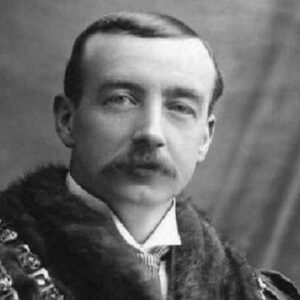Arthur Henderson was a British politician who was one of the first people to join the Labour Party. He also served in the British Parliament for several terms over the course of a long political career. Henderson was born into a working-class family, but when his father died when he was only 10, he fell into poverty quickly. Henderson had to stop going to school and start working in a foundry in Newcastle, England. He liked to argue while he was working at the foundry, and when he grew up, he became a leader in the trade unions, which led to him joining the Labour Party. Henderson was elected to Parliament several times through by-elections, and when the Labour Party was able to form a government, he was given cabinet positions. He was the President of the Board of Education and the Foreign Secretary. It was as the Foreign Secretary that he became a powerful voice for peace and diplomacy in a Europe that was becoming more and more divided politically. Henderson worked for peace even after he was no longer the Foreign Secretary. This earned him the Nobel Peace Prize in the end.
Early years and childhood
Arthur Henderson was born in Glasgow, Scotland, on September 13, 1863. His parents were David Henderson and Agnes Henderson. His father worked in the textile industry, and his mother was a housekeeper.
Arthur Henderson’s father died when he was only ten years old. This put a strain on the family’s finances, so Arthur had to quit school and look for work. He found a job at a photographer’s shop. After that, Henderson’s family moved from Scotland to Newcastle, which is in the north of England, and he went back to school.
Arthur Henderson got his first job as an apprentice at Robert Stephenson and Sons’ General Foundry Works when he was only 12 years old. Henderson tried to learn as much as he could by reading the news and talking to the other people who worked at the foundry.
Arthur Henderson became a Methodist and a local preacher in the same year, 1879.
Arthur Henderson’s Career
In 1890, the members of the Friendly Society of Iron Founders chose Arthur Henderson to be a paid organizer for their trade union. He became an active member of the trade union movement, but he didn’t like frequent strikes because he didn’t think they accomplished anything.
In the year 1900, Arthur Henderson joined the Labour Representation Committee (LRC). Three years later, he became the organization’s treasurer. That same year, he won a by-election in Barnard Castle and became a member of Parliament. The group that became known as the Labour Party was the LRC.
After Keir Hardie quit the Labour Party too soon in 1908, Arthur Henderson took over as leader. He stayed in that position until 1910 when he also gave up his position. But when Ramsay MacDonald quit the Labour Party in 1914 to protest the First World War, Henderson took over again.
Arthur Henderson joined the cabinet of the British government in 1915 when H.H. Asquith’s coalition government made him President of the Board of Education.
In 1916, David Lloyd George took over as Prime Minister from H.H. Asquith, and Henderson was named Minister without Portfolio. In 1917, Henderson quit as minister after his idea for an international conference on the war was turned down by the cabinet.
Arthur Henderson was elected as a Member of Parliament from Widnes again in 1919, a year after he had lost his seat. For the next three years, he was the leader of the Labour Party. Henderson was elected as a member of Parliament for Newcastle East and then for Burnley after he quit his job as Chief Whip.
Henderson was put in charge of the Home Office in 1924 when Ramsay MacDonald led the first Labour Party government. His job didn’t last long, though, because the government lost later that same year. In 1929, he joined another Labour government as the Foreign Secretary and worked hard to bring peace to Europe.
After the Great Depression, the British Parliament wanted to cut unemployment benefits, but Henderson was against it. In 1931, to stop the crisis, Ramsay MacDonald formed the National Government with other parties. The Labour Party could only get 46 seats, and Henderson lost his own seat and quit as party leader as a result.
He won a by-election in Clay Cross and got his seat back in parliament. After that, he kept working for peace and was a strong supporter of activities that were against the war. Between 1930 and 1934, he was in charge of the Geneva Conference to get rid of weapons.
Works of note
Even though he was one of the most powerful politicians of his time, most people say that his work as a peace activist was his most important work. He also strongly believed in the League of Nations.
Awards & Achievements
In 1934, Arthur Henderson was given the Nobel Peace Prize “for his work for the League of Nations, especially its efforts to disarm.”
Personal History and Legacies
In 1888, Arthur Henderson married Eleanor Watson. There were three boys and one girl in the family.
Henderson died in London, England, on October 20, 1935. He was 72 years old.
Estimated Net worth
Unknown.


